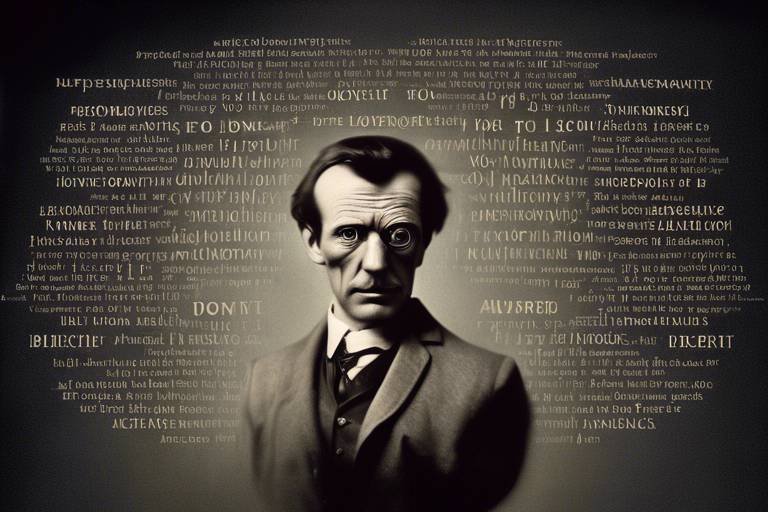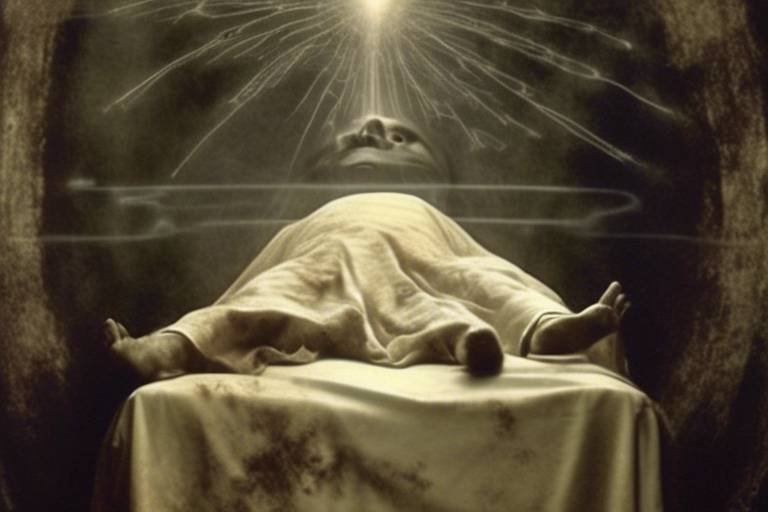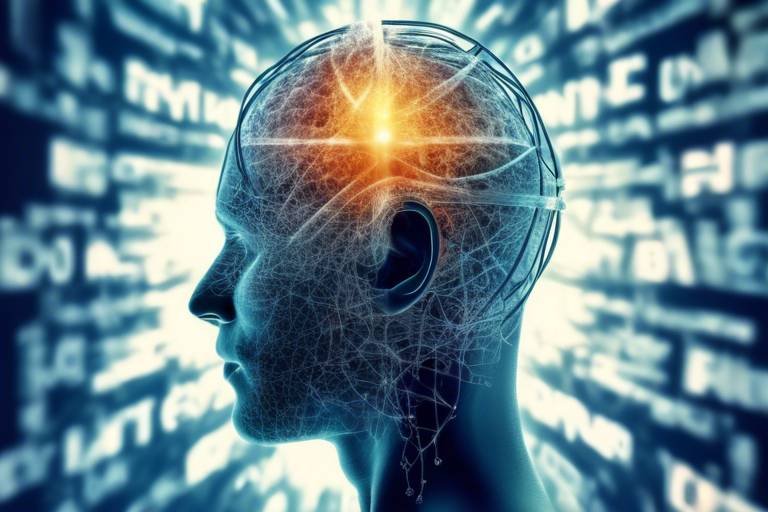Metaphysical Solutions to the Problem of Evil
The problem of evil has perplexed philosophers, theologians, and thinkers for centuries. It poses a profound question: If a benevolent and omnipotent God exists, why does evil persist in the world? This dilemma isn't just an abstract philosophical issue; it strikes at the very heart of human experience. As we navigate through life, we encounter suffering, injustice, and moral failings that challenge our understanding of divine goodness. In this exploration, we will delve into various metaphysical solutions that have been proposed throughout history, each offering unique insights into reconciling the existence of evil with the concept of a loving deity.
Metaphysical solutions to the problem of evil often involve a blend of philosophical reasoning and theological interpretation. These solutions aim to provide frameworks that help us make sense of suffering and evil in a world that is often chaotic and unpredictable. One common approach is to reframe our understanding of God's nature, suggesting that perhaps God’s omnipotence may not be as absolute as traditionally thought. This opens up a dialogue about the nature of divine power and how it interacts with human free will and the existence of natural disasters.
Another avenue of exploration is the purpose behind suffering. Some metaphysical perspectives argue that hardships and challenges are essential for personal and spiritual growth. This idea, often referred to as the "soul-making" theodicy, posits that through suffering, individuals can develop virtues such as courage, empathy, and resilience. In this sense, evil is not merely a force to be eradicated but a catalyst for human development and moral evolution.
As we look at these solutions, it's crucial to understand that they do not always provide definitive answers. Instead, they offer frameworks that can help individuals navigate their own beliefs and experiences regarding evil and suffering. For many, these metaphysical solutions provide a sense of hope and purpose, even in the face of overwhelming adversity.
In the following sections, we will delve deeper into specific metaphysical solutions, examining classical theodicies like the free will defense and soul-making theodicy, as well as modern responses such as process theology and existentialist perspectives. Each of these approaches presents a unique lens through which we can view the problem of evil, inviting us to reflect on our beliefs, our experiences, and the nature of the divine.
- What is the problem of evil? The problem of evil refers to the philosophical dilemma of reconciling the existence of evil with the belief in a benevolent and omnipotent God.
- What are classical theodicies? Classical theodicies are traditional explanations for the existence of evil, including the free will defense and soul-making theodicy.
- How does process theology differ from traditional views of God? Process theology suggests that God is not omnipotent in the traditional sense, allowing for a more dynamic relationship with the world and its suffering.
- What role does personal responsibility play in existentialist perspectives? Existentialist perspectives emphasize that individuals are responsible for creating meaning in their lives, especially in the face of suffering.

Understanding the Problem of Evil
The problem of evil is a philosophical dilemma that has puzzled thinkers for centuries. At its core, it questions how a world filled with suffering and injustice can coexist with the belief in an all-powerful, all-knowing, and benevolent God. This paradox is not just a theoretical exercise; it strikes at the heart of human experience, challenging our understanding of morality, justice, and the nature of divinity. Imagine a painter who creates a beautiful landscape but includes dark clouds and stormy weather. Why would a benevolent artist include elements that evoke fear and anguish? This analogy captures the essence of the problem of evil, as it forces us to grapple with the complexities of existence.
The significance of this dilemma extends beyond philosophical musings; it has profound implications for theology and ethics. For many, the existence of evil raises critical questions about faith. If God is all-good, why does He allow suffering? Is it a test, a punishment, or perhaps a necessary aspect of human freedom? These questions are not merely academic; they resonate deeply with individuals who experience pain, loss, and injustice in their lives.
Throughout history, various thinkers have attempted to address this problem, proposing different frameworks to reconcile the existence of evil with the concept of a loving deity. Some argue that evil is a necessary counterpart to good, while others suggest that our understanding of God must evolve to accommodate the reality of suffering. In this context, the problem of evil serves as a battleground for philosophical and theological discourse, challenging us to rethink our assumptions about morality and the divine.
To better understand this complex issue, let’s break down the problem of evil into two main categories:
- Moral Evil: This refers to the suffering caused by human actions, such as violence, theft, and betrayal. These actions raise questions about human responsibility and the consequences of free will.
- Natural Evil: This includes suffering resulting from natural disasters, diseases, and other phenomena beyond human control. It challenges our understanding of a benevolent deity's role in the world.
As we delve deeper into these categories, we begin to see that the problem of evil is not just about the existence of suffering; it also involves the nature of God and the human condition. Are we mere puppets, or do we possess the autonomy to shape our destinies? This inquiry leads us to the classical theodicies and their attempts to provide answers to these profound questions.

Classical Theodicies
Classical theodicies serve as foundational frameworks that attempt to explain the existence of evil in a world created by a benevolent and omnipotent God. These explanations are essential in the realms of theology and philosophy, as they engage with the profound question: How can a good God allow evil to exist? Two of the most significant classical theodicies are the Free Will Defense and the Soul-Making Theodicy. Each of these theories presents a unique perspective on the nature of evil and the implications for human existence.
The Free Will Defense posits that evil is a necessary consequence of granting humans the ability to make choices. This idea suggests that, without the capacity for free will, humans would be mere automatons, incapable of genuine love or moral responsibility. Imagine a world where every action is predetermined; it would lack the richness of human experience. However, this freedom comes with the risk of choosing evil, resulting in suffering and moral failings. Thus, the existence of evil can be seen as a byproduct of the greatest gift: our ability to choose.
On the other hand, the Soul-Making Theodicy argues that suffering and evil are essential for spiritual growth and moral development. According to this view, hardships and challenges are not merely obstacles but are opportunities for individuals to cultivate virtues such as courage, compassion, and resilience. Just as a sculptor chisels away at a block of marble to reveal a beautiful statue, the trials we face can shape our character and lead us toward a deeper understanding of ourselves and our place in the universe.
Both of these classical theodicies have profound implications for how we understand divine justice and human suffering. They suggest that evil is not an arbitrary force, but rather a complex interplay of free will and the need for personal growth. However, these arguments also raise important questions about the nature of God and the extent of divine intervention in the world.
To further illustrate the differences and similarities between these theodicies, consider the following table:
| Theodicy | Key Idea | Strengths | Weaknesses |
|---|---|---|---|
| Free Will Defense | Evil exists due to human choices. | Emphasizes human autonomy and moral responsibility. | Doesn't account for natural evils. |
| Soul-Making Theodicy | Suffering is essential for spiritual growth. | Highlights the potential for personal development through adversity. | May seem to trivialize the pain of suffering. |
In conclusion, classical theodicies provide a rich tapestry of thought that seeks to reconcile the existence of evil with the belief in a good and powerful God. They invite us to reflect on the nature of our choices and the transformative power of suffering, urging us to find meaning even in the darkest of times. As we navigate the complexities of life, these philosophical frameworks offer us tools to understand our experiences and the world around us.
- What is the problem of evil? The problem of evil is a philosophical and theological dilemma that questions how a benevolent and omnipotent God can allow evil and suffering to exist in the world.
- What are classical theodicies? Classical theodicies are traditional explanations that attempt to justify the existence of evil, primarily through the concepts of free will and soul-making.
- How does the Free Will Defense address evil? The Free Will Defense argues that evil results from human choices, emphasizing the importance of free will in moral responsibility.
- What is the Soul-Making Theodicy? The Soul-Making Theodicy suggests that suffering is necessary for personal and moral growth, helping individuals develop virtues through adversity.

Free Will Defense
The is a philosophical argument that attempts to explain the existence of evil in the world by attributing it to the choices made by human beings. This perspective suggests that a benevolent and omnipotent God allows evil to exist because it is a necessary consequence of granting humans the freedom to choose. Imagine a world where every action is predetermined; it might seem harmonious at first glance, but it would lack the rich tapestry of human experience that comes from authentic decision-making. The essence of this argument lies in the belief that true love and goodness can only exist in a context where individuals have the autonomy to choose otherwise.
At its core, the Free Will Defense posits that if humans are to be genuinely free, they must have the capacity to make choices that can lead to both good and evil. This autonomy is what allows for moral growth and development. For example, consider a parent who allows their child to make decisions, knowing that some of those choices may lead to mistakes. The parent understands that these experiences are crucial for the child's growth. Similarly, God’s allowance of free will is seen as a pathway to spiritual maturity and moral responsibility.
However, this defense is not without its criticisms. One major critique revolves around the existence of natural evils, such as natural disasters and diseases, which occur independently of human choice. How can these be reconciled with a benevolent deity who grants free will? Moreover, critics argue that the Free Will Defense does not fully account for the scale and intensity of suffering present in the world. It raises the question: if free will is so valuable, why does it seem to lead to such profound suffering?
In addressing these critiques, proponents of the Free Will Defense might argue that the potential for evil is a small price to pay for the greater good of free will. They suggest that the existence of evil serves to highlight the value of good, much like darkness emphasizes the beauty of light. In this view, the world is a stage where the drama of free will unfolds, allowing individuals to rise above their circumstances and make meaningful choices.
Ultimately, the Free Will Defense presents a compelling yet complex argument in the ongoing discourse surrounding the problem of evil. It invites us to reflect on the intricate balance between freedom and responsibility, and the profound implications of our choices. As we navigate through life, we are constantly faced with decisions that shape not only our own destinies but also the world around us. The question remains: can we embrace our freedom while acknowledging the weight of our choices?
- What is the Free Will Defense? The Free Will Defense is an argument that suggests the existence of evil is a result of human choices, as God grants individuals the freedom to choose between good and evil.
- How does the Free Will Defense explain natural evils? Critics argue that natural evils cannot be explained by free will, as they occur independently of human action. Proponents may suggest that these evils serve a greater purpose in the context of free will.
- Is free will more valuable than the existence of evil? Supporters of the Free Will Defense argue that the ability to choose freely is essential for moral growth, even if it leads to suffering.

Implications of Free Will
The concept of free will is a double-edged sword, isn’t it? On one hand, it empowers individuals to make choices that define their lives, leading to personal growth and moral development. On the other hand, it opens the door to the existence of evil, as individuals can choose paths that result in suffering—not just for themselves but for others as well. This paradox raises significant questions about the nature of humanity and the divine. If we are truly free, does that mean we are also responsible for the evils we commit? And if so, how does this align with the idea of a benevolent God who allows such freedom?
When we grant autonomy to humans, we essentially give them the ability to shape their destinies. This freedom can lead to remarkable acts of kindness and compassion, as individuals choose to help one another and contribute positively to society. However, this same freedom can also lead to **horrific choices**—like violence, betrayal, and deceit. This reality prompts us to consider the implications of free will more deeply. It’s like giving someone a paintbrush and a canvas; they can create a masterpiece or a chaotic mess, depending on their choices.
Moreover, the implications of free will extend beyond individual actions. They touch upon the very fabric of society. When people are free to make choices, they also bear the weight of those choices collectively. For instance, societal structures and norms can either promote justice or perpetuate injustice, depending on the choices made by individuals within that society. This interconnectedness raises questions about collective responsibility and whether we can truly claim moral superiority when we live in a world where choices lead to both good and evil.
To further illustrate these implications, consider the following points:
- Moral Responsibility: With free will comes the burden of responsibility. If individuals are free to choose their actions, they must also face the consequences of those actions, both good and bad.
- Potential for Growth: The freedom to make choices allows for personal development. Struggles and challenges often lead to greater resilience and empathy.
- Ethical Dilemmas: Free will can lead to complex moral dilemmas. Individuals must navigate their choices carefully, weighing their desires against the potential harm to others.
Ultimately, the implications of free will are profound and multifaceted. They challenge us to think critically about our actions and the world around us. The freedom to choose is a gift, but it is also a responsibility that we must take seriously. As we navigate our lives, we must remember that every choice we make contributes to the larger tapestry of human experience—an intricate blend of light and darkness, joy and suffering.
- What is the problem of evil? The problem of evil refers to the philosophical dilemma of reconciling the existence of evil in the world with the belief in a benevolent and omnipotent God.
- How does free will relate to the existence of evil? Free will allows individuals to make choices, which can lead to both good and evil actions. This autonomy is often cited as a reason for the existence of moral evil in the world.
- What are the implications of free will in society? Free will impacts collective moral responsibility, ethical decision-making, and the potential for both societal progress and regression.

Critiques of Free Will Defense
The free will defense has long been a cornerstone in the discussion surrounding the problem of evil, positing that the existence of evil is a necessary consequence of granting humans the freedom to choose. However, this argument is not without its detractors. Critics argue that while free will may explain some instances of moral evil—such as murder or theft—it falls short when addressing natural evils, like earthquakes or diseases. How can one justify the suffering caused by natural disasters through human choice? This question raises significant doubts about the sufficiency of the free will defense.
Moreover, the concept of free will itself is often scrutinized. If God is omniscient, does He not already know the choices individuals will make? This leads to a paradox: if God knows the future actions of every individual, can those actions truly be considered free? Critics argue that this undermines the very foundation of the free will defense, suggesting that divine foreknowledge could imply predestination, which complicates the notion of genuine freedom.
Another critique focuses on the scale of suffering in the world. The sheer volume of suffering, particularly in cases of innocent victims—such as children suffering from terminal illnesses—raises uncomfortable questions. Can we really justify the existence of such profound suffering as a necessary condition for free will? Critics argue that a benevolent deity would not allow such extremes of suffering, especially to those incapable of making moral choices. This leads to the conclusion that the free will defense may not adequately account for the depth and breadth of evil present in the world.
Additionally, some philosophers point out that the free will defense does not sufficiently address the problem of systemic evil. For instance, societal structures that perpetuate injustice, poverty, and inequality often exist independently of individual choices. If these structures lead to widespread suffering, how does free will explain their existence? Critics argue that this systemic aspect of evil requires a more complex understanding of morality and human interaction than the free will defense can provide.
In summary, while the free will defense offers a compelling explanation for certain types of evil, it faces significant challenges. Critics highlight the inadequacies in addressing natural evils, the implications of divine foreknowledge, the overwhelming scale of suffering, and the role of systemic injustices. These critiques invite deeper exploration into the nature of evil and the complexities of human existence, suggesting that perhaps a multifaceted approach is necessary to fully understand the relationship between free will and the existence of evil.
- What is the problem of evil?
The problem of evil is a philosophical dilemma that questions how a benevolent, omniscient, and omnipotent God can allow the existence of evil and suffering in the world. - How does the free will defense explain evil?
The free will defense argues that evil exists because God granted humans the freedom to choose, and with that freedom comes the potential for both good and evil actions. - What are the main critiques of the free will defense?
Critiques include its inability to explain natural evils, the implications of divine foreknowledge, the scale of suffering, and the existence of systemic injustices. - Are there alternatives to the free will defense?
Yes, alternatives such as soul-making theodicy and process theology offer different perspectives on the existence of evil and the nature of God.

Soul-Making Theodicy
The presents a compelling argument that suffering and evil are not merely obstacles to human existence but rather essential components of spiritual growth. This perspective, often attributed to the philosopher John Hick, suggests that our experiences of hardship and adversity serve a greater purpose in shaping our character and moral fiber. Think of life as a sculptor chiseling away at a block of marble; each chip of suffering reveals the beauty and potential within us. Without these challenges, we would remain unrefined, lacking the depth and resilience that comes from overcoming life's trials.
At its core, the soul-making theodicy posits that the world is a developmental arena where individuals can cultivate virtues such as compassion, courage, and empathy. In this view, the existence of evil and suffering is not a contradiction to the idea of a benevolent deity but rather a necessary aspect of a world designed for growth. By facing difficulties, people are given opportunities to make meaningful choices, which ultimately contribute to their spiritual evolution. This perspective raises an important question: how can we truly appreciate joy without first experiencing pain?
One of the key implications of the soul-making theodicy is that it encourages a shift in how we perceive suffering. Instead of viewing it solely as a negative force, this theodicy invites us to consider suffering as a teacher. For instance:
- Empathy: Experiencing pain can deepen our understanding of others' suffering, fostering a sense of connection and compassion.
- Resilience: Overcoming challenges can build inner strength and resilience, preparing us for future adversities.
- Character Development: Struggles can lead to the cultivation of virtues such as patience, humility, and perseverance.
However, critics of the soul-making theodicy argue that it may not adequately address the extent and intensity of suffering present in the world. For example, how can we justify the immense suffering caused by natural disasters or the suffering of innocent children? These questions challenge the notion that all suffering has a redemptive purpose. While proponents believe that every hardship contributes to our soul's development, critics contend that some forms of suffering appear senseless and disproportionate.
Moreover, the soul-making theodicy raises another interesting point: if suffering is essential for growth, does that imply that a benevolent God intentionally allows pain and evil to exist? This leads to a complex discussion about divine intention and the nature of God. Is God a loving parent who allows their children to face challenges for their benefit, or is this a flawed understanding of divinity?
In conclusion, the soul-making theodicy offers a unique lens through which to view the problem of evil, emphasizing the transformative power of suffering. It invites us to reconsider our relationship with pain, framing it not merely as a burden but as a vital part of our spiritual journey. While it provides a hopeful perspective, it also opens the door to critical discussions about the nature of God, the purpose of suffering, and the complexities of human existence.
- What is the soul-making theodicy?
The soul-making theodicy is a philosophical argument suggesting that suffering and evil are necessary for spiritual growth and character development. - Who is associated with the soul-making theodicy?
John Hick is one of the most notable philosophers associated with the soul-making theodicy. - How does soul-making theodicy explain natural disasters?
Proponents argue that even natural disasters can lead to personal growth and strengthen communities, though critics question this perspective. - Can suffering have a positive purpose?
According to the soul-making theodicy, suffering can foster virtues such as empathy, resilience, and character development.

Modern Responses to the Problem of Evil
The problem of evil has long been a thorn in the side of theology and philosophy, sparking heated debates and profound reflections. In the modern era, thinkers have sought to address this dilemma through innovative frameworks that challenge traditional views of divinity and suffering. Two notable modern responses include process theology and existentialist perspectives. These approaches not only redefine our understanding of God but also emphasize the human experience in the face of adversity.
Process theology presents a radical shift in how we perceive God's relationship with the world. Unlike classical theism, which portrays God as an omnipotent being who controls everything, process theology suggests that God is not all-powerful in the traditional sense. Instead, God is seen as a participant in the unfolding of reality, influencing but not dictating the course of events. This view implies that God experiences the world's suffering alongside humanity, which can be both comforting and troubling. It raises the question: if God is not all-powerful, how do we reconcile the existence of evil with divine love? In this framework, evil is understood as a consequence of the freedom inherent in creation, where both God and humans are engaged in a dynamic relationship.
On the other hand, existentialist perspectives offer a more personal and subjective approach to the problem of evil. Existentialism emphasizes individual responsibility and the search for meaning in a world filled with suffering. Thinkers like Jean-Paul Sartre and Simone de Beauvoir argue that while suffering is an undeniable part of the human experience, it is our responsibility to confront it and find significance in our struggles. This perspective encourages individuals to embrace their freedom and make choices that define their existence, even in the face of overwhelming adversity. In this context, the problem of evil is not merely a philosophical puzzle but a lived reality that demands action and engagement.
Both process theology and existentialism challenge traditional notions of divine omnipotence and invite us to reconsider our understanding of suffering. They suggest that rather than viewing evil as a mere obstacle to faith, we can see it as a catalyst for growth and transformation. In fact, many modern thinkers argue that grappling with the problem of evil can lead to a deeper understanding of ourselves and our place in the universe.
To illustrate the differences and similarities between these modern responses, consider the following table:
| Aspect | Process Theology | Existentialist Perspectives |
|---|---|---|
| View of God | Not omnipotent; a participant in creation | God is irrelevant; focus on individual agency |
| Nature of Evil | Result of free will and dynamic relationships | A part of the human condition to be confronted |
| Human Response | Engagement with God and creation | Personal responsibility and meaning-making |
Ultimately, these modern responses to the problem of evil invite us to rethink our assumptions about divinity and suffering. Rather than seeking easy answers or definitive solutions, they encourage us to engage with the complexity of our existence. By recognizing the interplay between divine influence and human freedom, we can cultivate a richer understanding of life’s challenges and the potential for growth that lies within them.
- What is the problem of evil? The problem of evil is a philosophical and theological dilemma that questions how a benevolent, omnipotent God can allow the existence of evil and suffering in the world.
- What is process theology? Process theology is a modern theological perspective that redefines God's nature, suggesting that God is not all-powerful in the classical sense but rather a participant in the ongoing process of creation.
- How do existentialist perspectives address suffering? Existentialist perspectives emphasize personal responsibility and the search for meaning in suffering, encouraging individuals to confront their challenges and find significance in their struggles.

Process Theology
Process theology represents a fascinating shift in how we understand the nature of God, especially in relation to the existence of evil. Unlike traditional views that depict God as an all-powerful, all-knowing being who orchestrates every detail of the universe, process theology posits that God's power is not coercive but persuasive. This means that God is constantly interacting with the world and its events, guiding rather than controlling, which opens up a new avenue for addressing the problem of evil.
At the heart of process theology is the idea that God is evolving along with creation. This perspective suggests that God experiences the world in real-time, feeling the pain and suffering that humanity endures. So, rather than being a distant observer, God is deeply invested in our struggles. This leads to a profound theological implication: if God is not omnipotent in the classical sense, then the existence of evil can be seen as a result of the natural processes of the world, rather than a failure on God's part to prevent it.
One of the most intriguing aspects of process theology is how it reframes the concept of divine power. Instead of viewing God as a supreme ruler who intervenes at will, process theology presents God as a guiding force that works with the inherent freedom of creation. This means that while God desires good and strives for the flourishing of all beings, the presence of evil and suffering can still occur as a consequence of the freedom granted to creatures. This perspective allows for a more nuanced understanding of divine justice, suggesting that God's role is not to eliminate evil outright but to provide the resources and inspiration necessary for humanity to confront and overcome it.
In summary, process theology invites us to reconsider our assumptions about divine omnipotence and the nature of evil. By emphasizing a relational God who is deeply engaged with creation, it offers a compelling framework for understanding how a benevolent deity can coexist with the reality of suffering. This perspective encourages us to see our struggles not as evidence of divine abandonment but as opportunities for growth, resilience, and deeper connection with the divine.
- What is process theology? Process theology is a theological perspective that views God as evolving alongside creation, emphasizing a relational and persuasive power rather than coercive omnipotence.
- How does process theology address the problem of evil? It suggests that while God desires good, the freedom of creatures can lead to the existence of evil, allowing for a more nuanced understanding of divine justice.
- Is God still considered powerful in process theology? Yes, but God's power is understood as persuasive rather than controlling, meaning that God works within the natural processes of the world.

Existentialist Perspectives
Existentialist perspectives on the problem of evil delve into the very fabric of human existence, emphasizing that individuals are not merely passive observers of their fate but active participants in shaping their own lives. This viewpoint suggests that the presence of evil and suffering is not just a philosophical dilemma but a lived reality that each person must confront. Think about it: when faced with adversity, we often find ourselves at a crossroads, where our choices define not only our character but also our understanding of meaning in a seemingly indifferent universe.
At the heart of existentialism is the idea of personal responsibility. Existentialist thinkers like Jean-Paul Sartre and Simone de Beauvoir argue that we are condemned to be free, meaning that we have the power—and the burden—to make choices that reflect our values and beliefs. In this light, suffering is not merely a problem to be solved but a catalyst for growth and self-discovery. For instance, when one faces challenges head-on, they may emerge with a deeper understanding of themselves and their place in the world. It's akin to a sculptor chiseling away at a block of marble; each strike reveals a more refined form, albeit through a process that can be painful and messy.
Moreover, existentialists assert that meaning is not inherent in the world but is something we must create for ourselves. This perspective can be liberating yet daunting. It posits that in a world where evil exists, finding purpose becomes a personal quest. As individuals confront their suffering, they are faced with the question: "What does this mean for me?" This inquiry is crucial, as it can lead to various responses that shape one's existence. For example:
- Some may turn to artistic expression, using their pain as fuel for creativity.
- Others might seek community, finding solace and understanding among those who share similar struggles.
- Still, some may engage in philosophical exploration, pondering the nature of existence and their role within it.
In this way, existentialism reframes the problem of evil from a purely theological or philosophical issue into a deeply personal journey. It invites individuals to confront their suffering and to grapple with the inherent chaos of life. This approach does not shy away from the harsh realities of existence; instead, it embraces them, suggesting that through our struggles, we can cultivate resilience, empathy, and a richer understanding of what it means to be human.
Ultimately, existentialist perspectives encourage us to recognize that while we cannot control the presence of evil in the world, we can control our responses to it. This empowerment is what makes existentialism a powerful lens through which to view the problem of evil. It challenges us to ask ourselves: "In the face of suffering, how will I choose to live?" By embracing our freedom and responsibility, we can transform our experiences of evil into opportunities for profound personal growth.
1. What is the main focus of existentialist perspectives on the problem of evil?
Existentialist perspectives focus on personal responsibility and the individual's role in creating meaning in the face of suffering and evil. They emphasize that each person must confront their challenges and define their existence through their choices.
2. How does existentialism differ from traditional theodicies?
Unlike traditional theodicies, which often seek to justify the existence of evil through divine reasoning, existentialism places the onus of meaning-making on the individual, suggesting that meaning is not inherent but created through personal experience and choice.
3. Can existentialism provide comfort in times of suffering?
Yes, existentialism can provide comfort by empowering individuals to take control of their responses to suffering, encouraging them to find purpose and growth even in difficult circumstances.
Frequently Asked Questions
- What is the problem of evil?
The problem of evil is a philosophical dilemma that questions how a benevolent, omnipotent, and omniscient God can allow evil and suffering to exist in the world. It challenges the consistency of God's attributes with the reality of human suffering, making it a significant topic in theology and ethics.
- What are classical theodicies?
Classical theodicies are traditional explanations that attempt to justify the existence of evil in a world created by a good God. They include concepts like free will, which suggests that humans have the autonomy to choose between good and evil, and soul-making, which posits that suffering is essential for spiritual and moral growth.
- How does the free will defense work?
The free will defense argues that evil results from human choices rather than divine will. By granting individuals free will, God allows for the possibility of evil actions, which can lead to moral growth. However, this raises questions about whether free will can adequately explain all forms of suffering, particularly natural disasters.
- What are the critiques of the free will defense?
Critiques of the free will defense focus on its limitations, particularly regarding natural evils like earthquakes or diseases that cause suffering without human choice. Critics argue that if God is truly benevolent, then even the existence of such natural evils poses a challenge to the adequacy of the free will defense.
- What is soul-making theodicy?
Soul-making theodicy suggests that suffering is necessary for personal and moral development. It claims that through hardships, individuals can cultivate virtues such as compassion, resilience, and empathy. This perspective emphasizes the transformative potential of suffering in shaping character.
- How do modern responses address the problem of evil?
Modern philosophical responses include process theology, which redefines God's nature, suggesting that God is not omnipotent in the traditional sense and thus can be affected by human actions. Existentialist perspectives emphasize personal responsibility and the search for meaning in suffering, encouraging individuals to confront adversity with agency.
- What is process theology?
Process theology posits that God is in a dynamic relationship with creation, evolving alongside it. This view challenges the classical notion of God's omnipotence, suggesting that while God is powerful, He does not control every event, allowing for the existence of evil as a consequence of free will and the natural order.
- How do existentialist perspectives contribute to understanding evil?
Existentialist perspectives focus on the individual's role in creating meaning amidst suffering. They argue that while evil exists, it is up to individuals to confront it and find personal significance in their experiences. This emphasis on agency encourages a proactive approach to dealing with adversity.



















